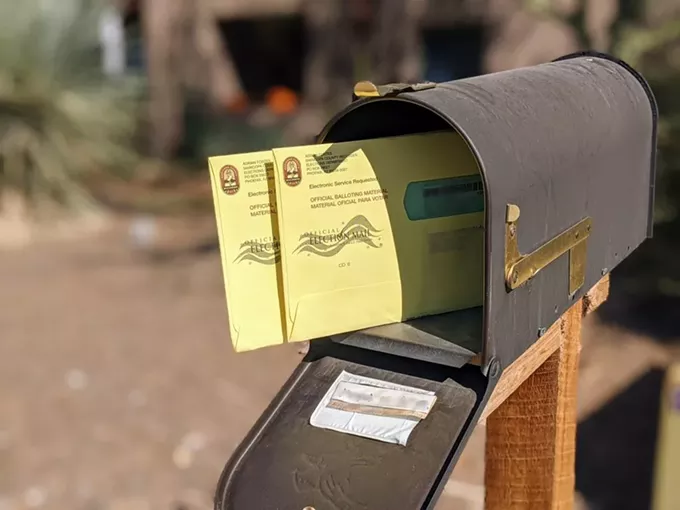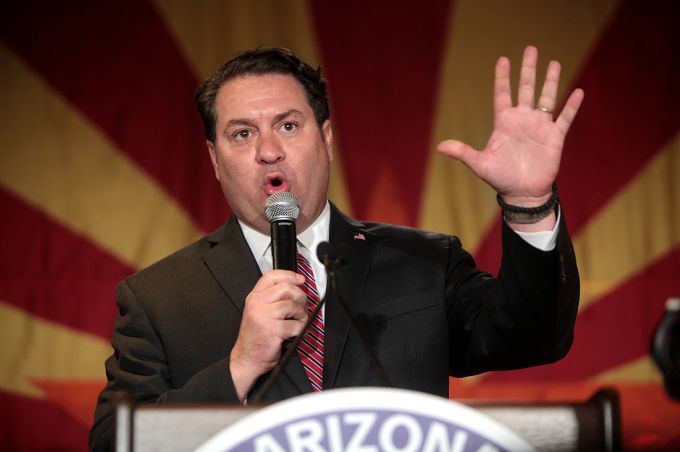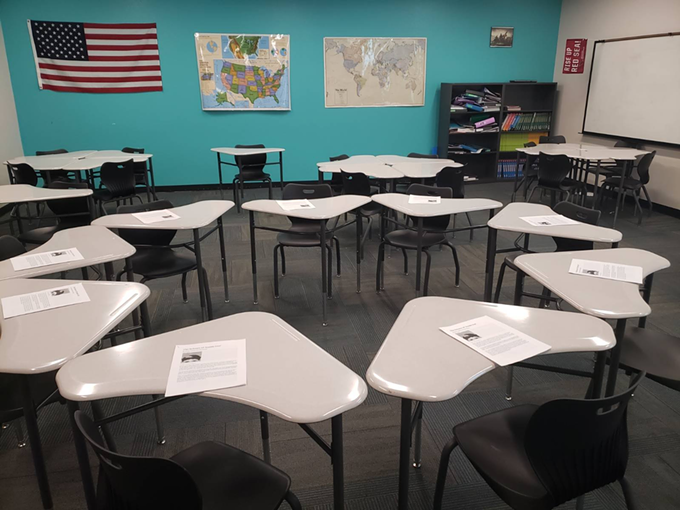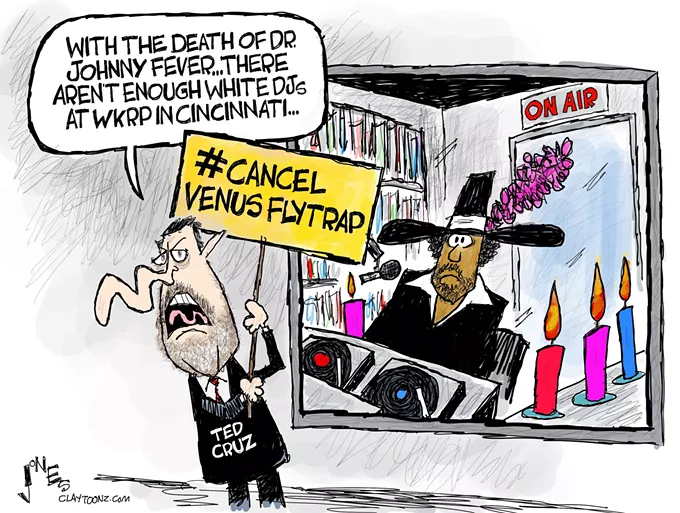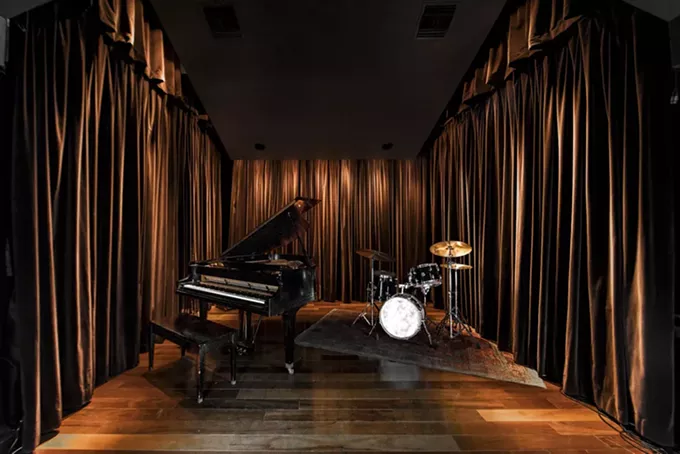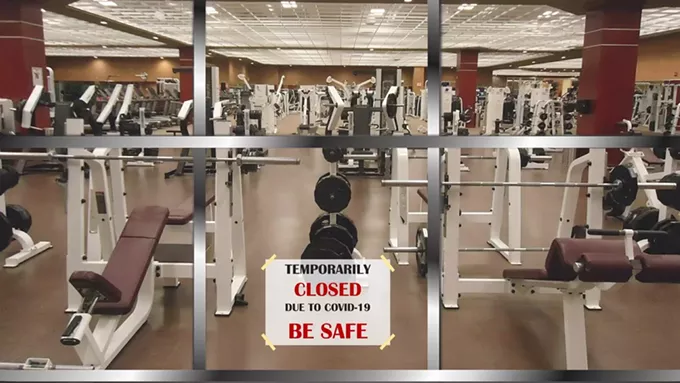Tuesday, February 8, 2022
Nail-biter elections that last two weeks after the polls close could be a thing of the past under a proposed measure that could be on the November ballot — with the trade-off that Arizonans will have fewer options for casting their votes.
The proposed ballot measure is called the Easier to Vote, Harder to Cheat Act, though the title is a misnomer. Some of its provisions would make it harder to vote, and appear to have little to do with making it harder to cheat.
Republican election attorney Lee Miller, who’s working on the campaign, said the act’s primary purpose is actually to make it easier to count ballots quickly. Arizona’s prolonged ballot-counting process generates distrust and suspicion in voters, Miller said.
“What we’re really trying to do here — and I will acknowledge the initiative doesn’t come right out here and say this — what we’re really trying to do is put the counties in a position where 99% of the votes cast in any particular general election are counted by the time the sun comes up on the Wednesday after the election,” said Miller, who served assistant secretary of state under Republican Secretary of State Michele Reagan from 2015-18.
Those suspicions become magnified when leads change as the counts wear on, Miller said. That has certainly been true in the past two election cycles, at least when the leads change in favor of Democrats. In 2018, Republicans led several big statewide races on election night, only to see Democrats overtake them to win campaigns for U.S. Senate, secretary of state, superintendent of public instruction and Corporation Commission.
The votes counted after Election Day are primarily early ballots that are dropped off at polling places on Election Day instead of being returned in the mail earlier. In both 2018 and 2020, Democratic candidates won more votes among those voters, allowing them to turn narrow deficits into victories.
“Sure, if you’re an election professional, you understand why that happens. But for the vast majority of the population, when they went to bed Tuesday night, they thought Steve Gaynor was going to be the secretary of state or Martha McSally was going to be Arizona’s next senator,” Miller said, referring to two Republicans who lost in 2018.
“That causes people to go, what happened?
Some Republicans falsely portrayed the 2018 lead changes as suspicious, though there was never any evidence that the count wasn’t legitimate. Democratic candidates have historically always gained ground after Election Day in Arizona, as election officials count early ballots that have been dropped off in person, which typically benefit Democrats.
Post-Election Day gains for Dem candidates are the norm, not the 2018 exception
Republicans didn’t raise similar alarms when GOP candidates overtook their Democratic opponents more than a week after the polls closed in 2020. Democratic County Recorder Adrian Fontes led Republican challenger Stephen Richer for four days, falling behind over the weekend after the election, one of several countywide Democratic candidates who saw their leads evaporate in the days after the election. Democrat Jevin Hodge also led Republican county Supervisor Jack Sellers for more than a week before losing his race.
The proposal seeks to speed up the ballot counts primarily by imposing new restrictions on early voting, which is used by some 80% of Arizona voters.
Currently, election officials must receive early ballots by Election Day in order to count them. Voters have 27 days to mail them, and can drop them off in person through the day of the election.
Under the Easier to Vote, Harder to Cheat Act, early voters would have four less days to cast their ballot: Only early ballots received in the mail or at drop-off locations by 7 p.m. on the Friday before the election would be counted. (This wouldn’t apply to military and overseas ballots, because of federal law.) Miller said the goal is to give the counties several days to process the ballots and verify the signatures that election officials use to confirm voters’ identities. The proposal would require those ballots to be counted by 11 p.m. on election night. It doesn’t say what happens if any of those early ballots are still uncounted at that point.
Voters would still have the option of dropping off their early ballots in person on Election Day. But rather than walk to the front of the line at a polling place and put their early ballot envelopes in a drop box, voters would have to wait in line and show ID to cast their ballots, like people who choose to cast their ballots in-person.
This would eliminate the need to verify the signatures on those ballots, which can be a time-consuming process. It would also prohibit people from dropping off ballots for their spouses or other family members who live in their households, and it would do away with the ease of dropping off an early ballot by potentially requiring a long wait before the voter could cast their ballot.
If you want to take advantage of the privilege of voting by mail, we ask you to exercise that privilege responsibly and get the ballot mailed back in a timely manner.
– Lee Miller
State law currently gives election officials five days after the election to “cure” signatures that can’t be verified, but the proposed ballot measure would eliminate that curing period. It would also eliminate in-person emergency voting in the days before the election.
“If you want to take advantage of the privilege of voting by mail, we ask you to exercise that privilege responsibly and get the ballot mailed back in a timely manner,” Miller said.
Distrust in elections, particularly among Republicans, has become a major issue in the wake of the 2020 election, when former President Donald Trump and many of his supporters have spread lies about the election being rigged against him in Arizona and other swing states where President Joe Biden defeated him. Polling has consistently shown that a majority of Republicans believe Biden won through fraud, though there has been no evidence to back up that claim.
The campaign for the ballot measure must collect at least 237,645 valid signatures from voters by July 7 to put the act on the November ballot. It hasn’t yet hired any paid petitioners for the campaign — effectively a must-have for any successful citizen initiative — but conversations about hiring signature-gatherers is underway, Miller said.
Miller would not say who is funding the measure, saying that information will come out when the campaign committee files its first campaign finance report in April. He also wouldn’t say who helped craft the measure. He confirmed that the committee received input from Republicans, but couldn’t say whether any Democrats worked on it. He said he’s not aware of any county election officials who were consulted in crafting the measure.
One former election official, former Maricopa County Recorder Helen Purcell, took a dim view of the measure. Purcell, a Republican who held the office for 28 years, wasn’t convinced that it would actually result in final ballot counts as quickly as Miller said.
“What if you got in 100,000 ballots that (final) day? How do you get them processed and make sure they’re all processed by that Tuesday?” she said. “I’ve seen the volume that we’ve had in the past. I would just be skeptical about whether or not that would happen.”
Purcell also questioned why counties shouldn’t be able to count early ballots they receive after 7 p.m. on the Friday before the election.
“How do you say that’s the arbitrary date that you’re going to count somebody’s ballot when you’ve actually received it by 7 o’clock on Election Day?” she said. “I don’t see that as being legitimate, because Election Day is Election Day.”
Pinny Sheoran, state advocacy chair and president-elect of the League of Women Voters Arizona, said there’s no good reason to eliminate popular voting methods or to reject legitimately cast ballots that arrive at county election offices before the close of polling on Election Day. And the 11 p.m. deadline for counting early ballots, she said, is based on an “untested time limit” that doesn’t take into consideration the time it takes to actually count ballots.
“A catchy title that claims to make it easier to vote while ensuring the law will make it harder to vote is equivalent to ‘putting lipstick on a pig’ and will not fool the public. While making Election Day a state holiday is laudable, everything else in this act would make it harder for voters,” Sheoran said.
How do you say that’s the arbitrary date that you’re going to count somebody’s ballot when you’ve actually received it by 7 o’clock on Election Day? I don’t see that as being legitimate, because Election Day is Election Day.
– Helen Purcell, former Maricopa County recorder
The one provision in the ballot measure that could make it easier for people to vote is that Election Day would become an official state holiday. Miller said that would provide more opportunities for people to vote in-person on Election Day.
The notion that making Election Day a holiday will make it easier for people to vote is an increasingly popular one among Republicans, many of whom propose the idea as compensation for either restricting or eliminating early voting. Several GOP lawmakers, primarily proponents of bogus claims about fraud in the 2020 election, have proposed legislation to create an Election Day holiday, often in conjunction with curbs on early voting.
However, elections experts say Election Day holidays are nothing more than a fig leaf that will do little to benefit most voters.
Sean Morales-Doyle, the acting director for voting rights and elections at the Brennan Center for Justice, isn’t opposed to the idea of making Election Day a holiday, but warned that it’s far from a panacea. Many people don’t get holidays off from work, such as those who work in retail, food service, health care, law enforcement, firefighters and others. A person who works in an office is a lot more likely to get the day off for such a holiday than a clerk at a Circle K, though the latter may have trouble getting out to vote on Election Day.
“The people who will benefit from Election Day as a holiday are often the people who aren’t struggling to find the time to go vote on Election Day anyway. And the people who are having the hardest time finding time to go vote on Election Day are least likely to be helped by Election Day as a holiday,” Morales-Doyle said.
The only people who would be guaranteed a day off to go vote on Election Day are government workers. Miller acknowledged that many people will still have to work on Election Day, even if it is a holiday. He said the campaign believes many private sector employers will understand how important it is and give their workers the day off. But the law wouldn’t force them to do so, he acknowledged, and employees who couldn’t get the day off to go vote would have no recourse.
“Folks still work on Christmas, Easter and Thanksgiving, without a doubt,” Miller said.
The measure includes a number of other provisions. It would expand opportunities for county political parties to have observers for the processing of early ballots, verification of signatures, and tabulation, duplication and adjudication of early ballots.
Within two days of an election, counties would have to post digital images of the ballots on their websites.
It would also prohibit the state and counties from disseminating voter registration or other election-related information in ways that intentionally targets people based on voters’ race, ethnicity, age, gender, geographic location or political affiliation.
Maria Dadgar, executive director of the Inter Tribal Association of Arizona, worried that the provision would prohibit voter education efforts aimed at Native Americans, whom she said face greater hurdles and challenges than other Arizonans when it comes to registering to vote and casting ballots.
Arizona Mirror is part of States Newsroom, a network of news bureaus supported by grants and a coalition of donors as a 501c(3) public charity. Arizona Mirror maintains editorial independence. Contact Editor Jim Small for questions: info@azmirror.com. Follow Arizona Mirror on Facebook and Twitter.
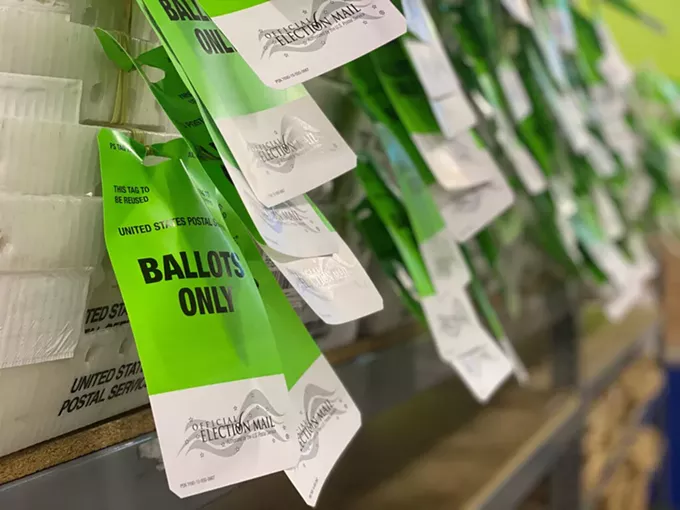
WASHINGTON – Arizona Democratic Party Chair Raquel Terán concedes that Democrats don’t have the numbers on their own to rebuff Republican election reform bills so she turned Thursday to an unlikely source for help: Republicans.
Terán, speaking on a panel of Democratic leaders from swing states, said it will likely take help from across the aisle to stop the most-extreme bills from passing in Arizona.
That may have happened already, with House Speaker Rusty Bowers on Tuesday referring the most-controversial election reform bill to 12 different House committees for review, a move seen by many as a way to bleed the bill to death.
“That bill is as dead as it can get at this moment,” said Rep. Jennifer Longdon, D-Phoenix. “And generally we don’t say that.”
But that does not mean Democrats are out of the woods: The National Conference of State Legislatures said that of 994 election-related bills filed in state capitals this year, 99 are in Arizona, or 10% of all such bills in the U.S. currently.
“Republicans in our state legislature have been active in putting forward bills that will make it harder for people to vote,” Terán, who is also a state senator, said during the discussion Thursday with Democratic leaders from Wisconsin and Michigan. The call was organized for Democrats to discuss ways they can combat GOP efforts to restrict voting rights in their battleground states.
Terán said that Democrats in Arizona face the trifecta of GOP control of the governor’s office and both chambers of the Legislature. That has forced them to go on “complete defense.”
“We are two seats away from majorities in the House, two seats away from majorities in the Senate,” said Terán, who is also a state senator from Glendale. “So we always just need one Republican to block legislation.”
What we’re really talking about here is protecting democracy, and that shouldn’t be a Democratic value or a Republican value.
– Rep. Jennifer Longdon, D-Phoenix
Getting Republicans to cross the aisle is “an uphill climb,” said Bob Grossfeld, a political and public affairs strategist at Politicare. But it’s not unheard of.
Besides Bowers’ move this week to hobble HB 2596, virtually every expert asked about the possibility of Republicans aiding Democrats pointed to Sen. Paul Boyer, R-Glendale.
Boyer last year bucked his party to oppose SB 1069, which would have removed voters from the Permanent Early Voting List if they had not voted early in the preceding two election cycles. He later supported a slightly modified version of that bill that became law.
Boyer also refused to join other GOP senators last year when they tried to hold Maricopa County supervisors in contempt as part of the partisan audit of county results from the 2020 presidential and Senate elections.
But while Boyer has been “a voice that has sided with the Democrats from time to time,” that does not mean they can count on him – or other Republicans – to join them if they don’t compromise as well, said Jason Rose, a Republican political consultant in Arizona.
He said there is a need for some electoral reform, but charged that Democrats have dug in their heels to gain an electoral advantage.
“The problem for the Democrats is they have developed a good sound bite and it’s voting rights,” said Rose. But he said some Republicans have responded “sometimes fairly, sometimes unfairly” with legislation that protects their own base of voters.
He said it will take “the sobriety of people that have been around the block that can forge great compromise” to move effective voting legislation.
“But until the personalities that often drive politics can emerge from the noise, you’re going to continue to have this paralyzing partisan pandering taking place,” Rose said.
Bowers this week appeared to target one of the most-extreme GOP election bills, HB 2596. It would eliminate early and mail-in voting, limit the number of polling centers to 1,500, require hand-counting of all ballots and give the Legislature the power to overturn election results. The bill even prohibits county officials from making people wear masks at polling places.
The newest GOP election proposal would allow lawmakers to reject election results
While that language may appeal to a certain set of Republican voters, it would likely anger most Arizona voters, “especially considering upwards of 80% or more … vote by early ballot,” said Paul Bentz, chief pollster at HighGround Inc.
Bentz said Bowers’ move with HB 2596 showed “that there (are) even Republicans who recognize that some of the proposals are not having merit and should not be really considered in any serious way.”
But HB 2596 is just one of scores of what one advocate calls “democracy-undermining bills” in the Legislature this year.
“It’s not just that one bill, the provisions that are in that bill are broken up into a bunch of other bills,” said Alex Gulotta, Arizona director of the group All Voting is Local.
“We have real concern, because there are extreme anti-democratic policies that are being pushed by a whole host of legislators that basically undermine our freedom to vote,” Gulotta said.
Grossfeld said Democrats should “not hold out a whole lot of hope for a Republican assist” in the Legislature. He said they would be better served by focusing on ballot initiatives and voter referendums “to stop the worst of the worst.”
The Arizona Democratic Party two weeks ago endorsed a proposed initiative that Terán said prevents “the Legislature from overturning future presidential elections …
establishes both the same-day and automatic voter registration, restores the popular Permanent Early Voting List and expands voting access to Arizonans with disabilities.”
While Democrats look for help from the other side of the aisle, Longdon said it shouldn’t be a partisan issue.
“What we’re really talking about here is protecting democracy, and that shouldn’t be a Democratic value or a Republican value,” Longdon said. “An accurate, secure and accessible election should be the goal of every legislator in this body.”
Cronkite News reporter Alexia Stanbridge contributed to this report.
Arizona Mirror is part of States Newsroom, a network of news bureaus supported by grants and a coalition of donors as a 501c(3) public charity. Arizona Mirror maintains editorial independence. Contact Editor Jim Small for questions: info@azmirror.com. Follow Arizona Mirror on Facebook and Twitter.
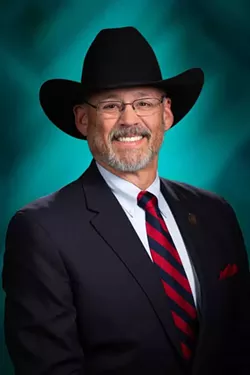
You can vote for both, but please don't ... Judging at the speed of business ... And the man just loved craps.
The future of voting in Arizona could be decided at the ballot box this year as two dueling ballot measures that are attempting to qualify for the ballot offer visions of voting that couldn’t be more different.
And then there’s whatever the Arizona Legislature will do, and the options range from nearly 100 election-related bills with hosts of smaller changes to straight-up decertifying an election (as a resolution filed by Arizona Rep. and not-a-lawyer Mark Finchem wants to do).
JUST IN:
— The AZ - abc15 - Data Guru (@Garrett_Archer) February 7, 2022
Speaker Bowers comment on @RealMarkFinchem decertification resolution that just dropped.
"Mr Finchem's obviously unconstitutional and profoundly unwise proposal will receive all the consideration it deserves"
h/t @MarkPhllpsnews
The Arizonans for Fair Elections measure, filed yesterday and backed by a coalition of local left-leaning groups, attacks a spate of laws from the past few years that limited voting access in Arizona and seeks to protect election results from potential overturning.
The measure has four goals, according to Joel Edman, the co-executive director for communications at ADRC Action: protecting the right to vote and access to voting, protecting election results from partisan meddling, protecting the public’s right to pass ballot measures and limiting the power of lobbyists and outside influence.
“Some of these are trying to address long-standing issues and build a democracy where we all have a voice, and some are more targeted to rolling back restrictions we’ve seen in the past few years,” Edman said.
Some of the elements of the measure will cost money, like increased Clean Elections funding for candidates who don’t accept money from outside sources and some funding for elections infrastructure. The costs will be covered by increasing the lobbyist registration fee from $25 to $50, increasing the minimum income tax for large businesses from $50 to $150 and restoring a $5 tax donation program for Clean Elections.
Monday, February 7, 2022
It's never boring to live in Arizona (and that's not a compliment) ... Brnovich should tell us his settlement with the Bar ... And the national press discovers Paradise Valley.
If you need more proof that Arizona was the hub of the attempted coup to overturn the 2020 election and install the former president for four more years and remains the center of attempts to subvert our fragile democracy, there’s a pair of stories in the New York Times you should check out.
Let’s start with Robert Draper’s extensive article detailing disgraced and pardoned Mike Flynn’s ongoing war on the 2020 election. It doesn’t take long to spot the Arizona ties.
A brief recap: After being forced to resign and pardoned for lying to the vice president and others about his dealings with Russia, Flynn, a one-time national security advisor to former president Donald Trump, allegedly pushed plans for a military coup following Trump’s loss, either by having the National Guard seize voting machines in contested states like Arizona or having Department of Homeland Security do it.
Friday, February 4, 2022
This week, we invited local teacher and fellow substacker Billy Robb back to write today’s top item about teaching during the pandemic. He wrote about a similar topic for us a few months ago. Now, after getting hit with the virus himself, he’s trying to forget about the trolls and focus on the kids. Down below, after Billy’s insight, we have your regularly scheduled bill roundup and look ahead to next week, along with something happening in virtual reality.
Schools are getting hit hard by this winter surge. I can attest to this personally now. After teaching without a hiccup for the entire first semester, I caught COVID-19 over winter break. For nearly two weeks at the start of the second semester, I was at home in isolation.
So began a chain reaction: My classes fell behind on content, because even if a school can find a substitute, learning is disrupted in the absence of the lead teacher. Additionally, each prolonged student absence creates a learning gap that needs to be addressed. This mad scramble is playing out in a public school system where teachers are already strained under the weight of counter-productive education policies.
Meanwhile, debates over COVID-19 mitigation efforts continue to rage.
Mask-mandates or mask-optional? Quarantine for exposures? And for how long? What about temperature checks?
It may feel as if we've made no progress in agreeing on how to safely run schools during a pandemic, but we've actually leaped a major hurdle. We're no longer debating open vs. closed. The overwhelming public health consensus is that, all things considered, it's better for students to be in school in person.
The Biden administration said that 96% of the nation's schools are open this January, compared to 46% last January. CDC director Rochelle Walensky reiterated a few weeks ago that schools should be the “first places to open and the last places to close.”
In Arizona, at the beginning of the pandemic, schools were closed down for months. Many schools remained in hybrid mode for an entire year. It’s only recently that we’ve reached a bipartisan consensus that schools should remain open the best they can.
As a teacher, when to open or close a school is not my call. I’m just trying to make good decisions and disseminate credible information.
Thursday, February 3, 2022
Over the last 100 years or so, Hotel Congress has survived structural fires, seen prohibition come come and go, and hosted everyone from U.S. senators to John Dillinger and his criminal gang. Now, a new addition to the historic landmark fuses a New York night club with a borderlands mezcal bar.
Shana Oseran, who owns Hotel Congress with her husband, Richard Oseran, and music programmer Arthur Vint are teaming up to open a jazz club in the hotel’s former Copper Hall space. The Century Room, with a grand opening planned in March, will host weekly jazz performances, serve local mezcals, beers and wines, and offer a step back in time.
“We have the plaza and Club Congress, which is the impetus for everything, and now to evolve into this third genre, it’s really exciting,” Oseran said. “Where in town, or anywhere, can you find a place that has three different music venues?”
The Copper Hall was a banquet hall along the southwest portion of the building with windows looking out to the hubbub of Congress Street. With a reduction in banquets and similar events due to the pandemic, Oseran was searching for a new concept to fill the vacant hall when she started talking with Vint.
“While there are lots of great jazz musicians and great jazz performances in Tucson, there hasn’t been a singular home to host concerts or touring acts,” Vint said. “There are lots of musicians who tour around the country, and these bands usually stop their tours in Phoenix and go home. By building a club and a stage that is world class, we’re hoping to get people to come down to Tucson on their West Coast tours.”

The Arizona Legislature could, maybe, finally act on Arizona’s affordable housing crisis with a bipartisan compromise bill from Arizona Reps. Steve Kaiser and César Chávez that attempts to peel back some barriers to affordable housing.
House Bill 2674 declares housing affordability as a “matter of statewide concern,” which is legislative-speak for preempting local entities from regulating in ways that defy the state. In a broad sense, the state has mostly stayed out of housing beyond some specific laws that restrict cities from regulating the price of rental homes and some lackluster funding for affordable or emergency housing projects.
The bill offers both a Republican and Democratic approach to the problem by imposing a host of rules cramping cities’ abilities to regulate residential housing, while offering a generational investment in the Arizona Housing Trust Fund, which helps promote affordable housing development. Some Democrats are already grumbling about taking away power from cities, and Kaiser described it as a “caucus cutter” at a press conference yesterday.
While some policies, like rent control, are a complete non-starter in the Republican-led Legislature, this at least has a chance.
The lack of state action has left cities and towns to manage the affordable housing crisis in whatever manner they see fit. So we see one-off initiatives like the Tempe one we mentioned yesterday, and efforts by the City of Phoenix to entice landlords to rent to low-income tenants by giving them some additional money. And the federal COVID-19 relief packages infused some money into local rental markets, but didn’t remove barriers to accessing that money. It’s not working.

WASHINGTON – Arizona Democratic Sen. Mark Kelly has raised more than $27.5 million for his reelection bid this fall, almost twice the total raised by a half-dozen Republican challengers, according to new campaign finance reports.
But political analysts said Kelly’s “giant war chest” – the fourth-most among Senate campaigns nationwide in 2021 – does not guarantee a win in a state like Arizona during a year that is expected to be rough for Democrats.
“He could have unlimited amounts of money … but if the political environment is really bad for Democrats, as it might be, there may be no amount of money he could spend that saves himself,” said Kyle Kondik, managing editor of Sabato’s Crystal Ball at the University of Virginia Center for Politics. He calls the Arizona Senate race a toss-up.
But for now, Kelly’s in a good position. Besides a sizable fundraising lead, he does not have a Democratic primary challenger, while his would-be Republican opponents face a bruising and costly primary before they can turn their sights on Kelly.
A poll released Tuesday by OH Predictive Insights showed Kelly would get 42% of the vote to 38% for any Republican candidate, with 19% of voters undecided. The online poll of 855 registered Arizona voters was taken Jan. 11-13 and has a margin of error of plus or minus 3.4%.
Wednesday, February 2, 2022
Mayors would no longer be able to order businesses to close during a state of emergency under a GOP-backed proposal fueled by anger stemming from the early days of the COVID-19 pandemic, when Arizona cities ordered many businesses to temporarily close.
It’s the latest attempt to reduce the use of emergency powers, following the advancement last week of a bill that would curtail the governor’s emergency powers.
In March 2020, the mayors of Phoenix and Tucson used those powers to mitigate the spread of COVID-19 by closing bars and setting a curfew for restaurant dining rooms.
In a House Military Affairs and Public Safety meeting Monday afternoon, Lake Havasu City Republican Rep. Leo Biasiucci said the power was being applied unevenly and to detrimental effect.
“When the pandemic was in play, small businesses were told they couldn’t be kept open, but Walmart and Home Depot were,” he said.
Oro Valley Republican Rep. Mark Finchem called mayors who closed businesses “petty tyrants” and said it was hypocritical to be worried about superspreader events when large retailers where lots of people could congregate were kept open.
More expansive square footage likely made it easier to social distance – which the CDC and the Arizona Department of Health Services still recommend as a strategy to reduce the spread of COVID-19.
Biasiucci said customers should be allowed to choose which businesses to visit and how to protect themselves. Ultimately, he said, businesses should decide when to close their doors, not local governments.
But Republicans on the committee dismissed this concern by pointing out that the mayor’s ability to declare evacuations — which would remain in law — solves that conflict.
Roxanna Pitones, a lobbyist for the League of Arizona Cities and Towns, said that limiting mayoral power would remove critical safeguards.
“These decisions are not made lightly, but are taken with public safety in mind,” she said.
Finchem responded that fires, floods and sinkholes are immediate emergencies, but the pandemic — which he referred to simply as the need to wear a mask and stay at home — is not. If it was, he argued, every business would still be shut down.
“There’s a difference between a real emergency and one under the guise of a ‘pandemic,’” he retorted, forming physical quotation marks with his hands.
To date, more than 26,000 Arizonans have died from COVID-19 and caseloads and hospitalizations have been at all-time highs in January.
Republican Rep. Teresa Martinez said that the indefinite nature of the pandemic is what is most harmful to businesses when they’re ordered to cease operations.
“With a fire, you can see a start date — when the fire starts — and an end date,” she said.
For Rep. Marcelino Quiñonez, D-Phoenix, the bill is undermining voter voices.
“Mayors were elected by communities to make decisions and provide guidance,” he said.
The bill passed along party lines, with Republicans supporting it; the next step is for consideration by the full House of Representatives.


